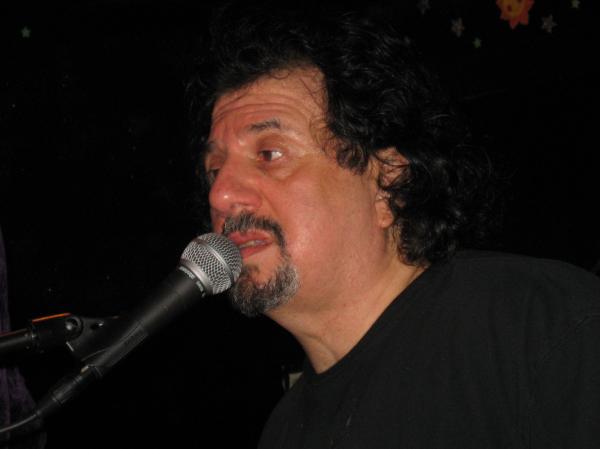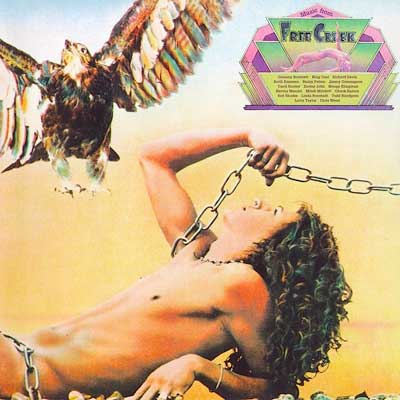Moogy Klingman (September 7, 1950-November 15, 2011): ‘Moogy was a hustler who was always pushing and could be obnoxious--he just didn't care what you thought about him. But it was that very relentlessness that produced so much great music and often benefited those around him.’You Gotta Have Friends Like Moogy
By Michael Sigman
You got to have friends/To make that day last long.
You may not have heard the name Mark Klingman, but you have heard and enjoyed his music. The prolific singer/songwriter/keyboardist/producer/political activist known as Moogy, who passed away on November 16, 2011, after a long, brave bout with cancer, not only enjoyed a stellar solo career, but also crossed musical paths--often at defining moments--with such pop/rock giants as Jimi Hendrix, Bob Dylan, Eric Clapton, The Left Banke, Todd Rundgren, Bette Midler, Barry Manilow, Carly Simon, Paul Winter and Guns N' Roses.
Moogy and I became friends in Great Neck, Lawn Guyland, when we were 8 or 9. He was the scraggly-haired kid up the street with the evocative name and the cool basement, where we traded DC comics and he spun 45s like a pre-stoned-age Murray the K. My mom admired Moogy's mom for being a committed "lefty," and I learned that word referred to something more than my southpaw status in stickball.
As we crossed the threshold of teenagery I lost track of Moogy, but rediscovered him in his high school incarnation as a '60s radical--before that term was commodified--and an amazing rock ‘n’ roll singer and keyboardist.
When Moogy was 15, his sister, who was dating someone in Dylan's entourage, swung her brother a "kin" pass to the Newport '65 Folk Festival, and he hung out with Dylan both before and after the "electric" set that became a seminal moment in rock & roll history. (Moogy would later be managed by Dylan's manager, the legendary Albert Grossman.)
When Moogy returned to high school that fall, his band, The Living Few, played a dance in the Great Neck South High School gym. Instead of the pop hits of the moment, they began with a blistering version of "Maggie's Farm" -- one of the tunes Dylan had played at Newport--and for me high school dances would never be the same.
Moogy moved into Manhattan after his gig at the Great Neck South High Civil Rights concert ended in fiasco--some would say near-riot--after Steve Sloane, the Zelig of our class, performed a strip tease. (At that same show Moogy took the hand of Andy Kaufman, another Great Necker, leading the deadpan "blind Cuban refugee" to his conga drums for Kaufman's first public performance.) Within a year, at age 16, Moogy was playing with Jimi Hendrix's band, Jimi James and the Blue Flames, at the Cafe Wha in the Village.
Bette Midler performs Moogy Klingman's 'You've Got To Have Friends' on the TV special An Evening With the Friends of The Environment (1990)By the time we were 22, Moogy had written a huge hit song--Bette Midler's "You've Got to Have Friends"--and recorded a solo album for Capitol. Our relationship became professional for a moment when I wrote a profile of him for Record World magazine.
Moogy went on to, among myriad accomplishments, front his own bands; become a founding member of Todd Rundgren's Utopia; participate in the "lost" supersession Music from Free Creek with Eric Clapton, Jeff Beck, Dr. John, Linda Ronstadt, Mitch Mitchell, Jeff Beck, Keith Emerson and other superstars; and produce the Dylan-Midler duet of "Buckets of Rain" for Bette's album Songs From the New Depression.
'Getting Back To Molly,' from Music From Free Creek, the 'lost' supersession featuring Dr. John, Eric Clapton, Linda Ronstadt, Keith Emerson, Jeff Beck, and others, with Moogy Klingman on harmonica.Until a year or so before his death, my contact with Moogy was limited to high school reunions--where he could be seen handing out flyers for forthcoming gigs--or chance meetings in Greenwich Village or the Lower East Side, where, as often as not, was handing out flyers for anti-war rallies. And, every now and then, word arrived about yet another Great Neck musician whose career Moogy helped along without asking anything in return.
A benefit concert to help defray Moogy's medical expenses, held in January at the Bitter End, brought out Peter Yarrow, David Amram, Randy Brecker, Danny Kortchmar's group the Kingbees and Moogy's own outfit the Peaceniks. (Yes, remarkably, Moogy was still rockin'.)
'Pray For Me,' The Peaceniks live at the P&G Bar, November 20, 2010, with Moogy Klingman on keyboards, Barry Gruber, Jim Satten and Mark Greenberg: 'Moogy was still rockin'.'A sold-out Utopia reunion concert saluting Moogy last January at the Highline Ballroom in Manhattan brought together the original members of the band Moogy had organized more than two decades ago--Todd Rundgren, Ralph Schuckett, John Siegler, Kevin Ellman and, of course, Moogy himself.
Moogy was a hustler who was always pushing and could be obnoxious--he just didn't care what you thought about him. But it was that very relentlessness that produced so much great music and often benefited those around him.
Steve Sloane--who gave the eulogy and hosted Moogy's funeral program on December 15 at the Bitter End in Greenwich Village--reports that, "of the fifteen or so testimonials given from the stage, some of them through tears, and several private conversations, two things stood out: grateful appreciation for Moogy's unflagging commitment to social justice, and appreciation for Moogy's brilliant networking ability, which he used not only to promote his own career but also to help struggling, up and coming talents."
Writer/editor, media consultant, music publisher Michael Sigman is a regular Huffington Post blogger. Follow Michael Sigman on Twitter: www.twitter.com/majorsongs
***
Moogy Klingman on the Music from Free Creek Sessions
(2001 Q&A from the Mitch Mitchell Chronology)
Moogy: There I was, around 19 years old at the time and I just kind of stumbled into working with all these superstars. And in many instances, I wasn't just working with them, I was running the show. Telling people like Jeff Beck and Eric Clapton what to do. It was almost an "Emperor's New Clothes" situation. At any moment someone could yell out, "Who the fuck are you, sonny, to tell us what to do?", but that never happened. Well, it almost happened a few times, but I knew when to back off.
And just what had you done in the music business back in '69 to merit your inclusion?
Moogy: A lot of it was being in the right place at the right time. I had left high school and moved to Greenwich Village from Great Neck, Long Island, several years earlier. I was really an early starter in the music biz. I was jamming in the village with everyone there for several years already. I had even played in Jimi Hendrix's group, Jimi James and the Blue Flames, when I was 16.
What was the first Free Creek session like?
Moogy: I can still remember walking into the studio for the first session with Earl and seeing an array of great musicians. Mitch Mitchell from the Jimi Hendrix Experience was banging away at the drums. Keith Emerson of Emerson, Lake and Palmer was playing Hammond organ, Chris Wood, the flutist from Traffic, was blowing riffs in the corner and Buzzy Feiten, the new lead guitarist from the Paul Butterfield Band, was burning some stinging solos as I sat down at the piano and kind of shrunk a little after hearing Keith and Buzzy and Mitch just really play some wild riffs. But things were disorganized as no one was really in charge. I went into the control room and Earl said, "Moogy, get things going out there. I'm depending on you." So I went out and let them know that I was kind of running things for Earl. "Now, who has any ideas for recording?" I said.
The first thing we recorded was "Freedom Jazz Dance,” which was an amazing jazzy jam from these rockers. Mitch Mitchell reminded me of Elvin Jones on the drums. Keith Emerson sounded like Jimmy Smith to me, really soulfull. I was surprised. It was Buzzy Feiten's idea to do the song. I mostly comped at the piano. Chris Wood couldn't really find the groove, so we left him off of it. Keith Emerson did "On The Rebound," a Floyd Kramer song with Buzzy Feiten and Mitch Mitchell. He did it kind of as a response to "Kilpatrick's Defeat,” my country piano song. All through this album I pushed some of the British rock stars to places they didn't normally go. Keith Emerson doing jazz and country was something you didn't hear him often do with his own records or group. Keith also had a great arrangement of "Mother Nature's Son," which I insisted he record. He was a sweet guy. Humble and self-effacing. Mitch Mitchell was great and a little angry. He had just been put on suspension by Jimi Hendrix while Jimi was working with other musicians, putting the Experience on ice for a while. Only a year later Jimi was to leave us all for good. The last song we recorded was "Hey Jude," which was Buzzy's arrangement. Keith Emerson had left by that time, there so I took over the organ duties and Mitch Mitchell kicked it on the drums. Earl was happy. We had recorded five songs over two days and they all sounded good.
Founder/Publisher/Editor: David McGee
Contributing Editors: Billy Altman, Laura Fissinger, Christopher Hill, Derk Richardson
Logo Design: John Mendelsohn (www.johnmendelsohn.com)
Website Design: Kieran McGee (www.kieranmcgee.com)
Staff Photographers: Audrey Harrod (Louisville, KY; www.flickr.com/audreyharrod), Alicia Zappier (New York)
E-mail: thebluegrassspecial@gmail.com
Mailing Address: David McGee, 201 W. 85 St.—5B, New York, NY 10024




